Hollywood heroines: Here to stay?
- Published
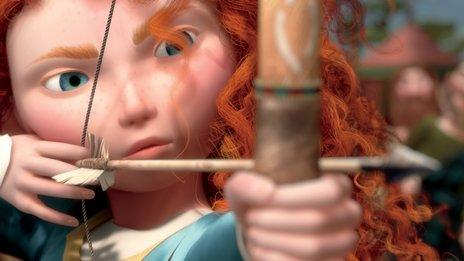
Brave's Merida is the first all-action heroine in a Pixar Movie
Hollywood has given us a number of female action heroes this year, with films like The Hunger Games - but is this a fad or a lasting trend, asks journalist Krystina Nellis?
Three of this year's top 10 movies have a female protagonist. The toughened heroines of The Hunger Games, Snow White and the Huntsman, and Disney's Brave are standing shoulder-to-shoulder with Batman, Spider-Man and the Men In Black.
It might not seem unusual - but if you examine the end-of-year charts for the rest of the 21st Century, only two female-fronted films have ever broached the top 10, and both were comedies: My Big Fat Greek Wedding in 2002, and Mamma Mia in 2008.
When there have been female action heroes, they have been forced to share the limelight - think Angelina Jolie v Brad Pitt in Mr and Mrs Smith.
Of this year's crop, 3D animation Brave (released in the UK on 13 August) stands out because it has been dubbed Pixar's first "girl hero" movie; one of the first such Hollywood films aimed primarily at children, influenced by the likes of Japan's Spirited Away, with its focus on young girls within fantastical environments.
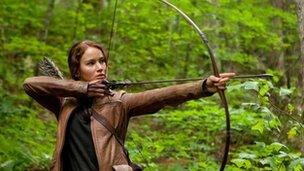
Jennifer Lawrence played the resourceful Katniss Everdeen in The Hunger Games
If it heralds a trend, though, it is a "very long and slowly developing" one, according to Empire magazine's Dan Jolin.
He points out that it has been 33 years since the "very significant" casting of Sigourney Weaver in seminal sci-fi film Alien.
"And not as a victim or as a scream queen, but as a physically and mentally capable person."
Weaver's character, Ellen Ripley, was not "a warrior woman, which has become more prevalent," Jolin notes. "She's just a very capable person who happens to be a woman."
Yet decades have passed since Ripley first defeated an alien. Why has it taken so long to dream up similarly smart and tough heroines?
Tony Gilroy, director of The Bourne Legacy, is pragmatic. He says the main reason is "because [men have] controlled everything for so long".
"Gradually, as we lose control, things will get better," he laughs.
Maternal instinct
One legendary character, Sarah Connor from the Terminator films, is forced into action by that most feminine of instincts - protective motherhood.
Conversely, The Hunger Games' Katniss Everdeen, is protective of her sister, whose place she takes in a televised death match. But she shows notably little desire to become a parent herself. Even her romance is partly for show.
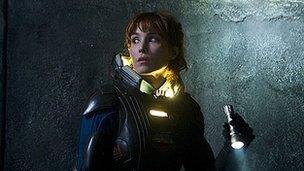
Noomi Rapace played the Ripley-esque female protagonist in Prometheus
In contrast, Black Widow - Scarlett Johansson's character in this summer's Avengers Assemble - is defined by a strength and intelligence that makes her easily the equal of her technologically-modified beefcake colleagues.
And Noomi Rapace was gifted Prometheus' most disturbing scene, a uniquely female take on Alien's notorious chest-burster sequence, which acts as a symbolic rejection of unconditional motherly love.
The actress relished the opportunity to get inside a more complex character, remarking that "it's so much more fun to play someone with lots of layers".
"There's so many things you can work on instead of being just sweet," the Swedish star continues.
Teenage boys
Stepping away from the bombast of 21st Century blockbusters, it becomes apparent that mainstream cinema once embraced more complex female characters.
However, they were often framed in the context of "women's films", romances and melodramas like Mildred Pierce, which earned its star Joan Crawford an Oscar in 1946.
The film noir sees Crawford's character defined by her struggle to provide for her ruinous daughter, minus a hero figure.
The actress - who went on to become a director of the Pepsi-Cola company - played a number of dramatically sophisticated female characters throughout her career, and earned another Oscar nomination for 1947's Possessed, in which she portrayed a mentally ill woman.
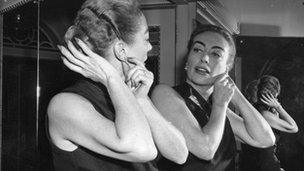
Joan Crawford rose from the chorus line to become one of Hollywood's leading ladies
When asked if she ever worried the career women she played might make her "hard", Crawford simply responded: "No no, I save that for the screen. I harness that intensity, and I hold it," demolishing the myth that strong female characters are, by default, hardened.
Talking to David Frost in 1970, Crawford declared her favourite role "naturally, Mildred Pierce - I was lucky".
Later that decade, female protagonists started to come into their own.
Ripley's survival in Alien, even ahead of "leading man" Tom Skerritt, turned Sigourney Weaver into an overnight A-list star.
Ultimately, though, it is one's ability to "open" a film solely on the strength of one's name that is crucial.
Anne Hathaway, currently playing Catwoman in The Dark Knight Rises, credits Meryl Streep, her co-star in The Devil Wears Prada, for boosting feminine dominance at the multiplex.
"Meryl really showed women can drive the box office," she explains. "Because women go to the movies more than men, people are starting to take note of that."
Teenage boys have long been regarded as the multiplex Holy Grail. It is surely no accident, then, that even the current crop of heroines sport supermodel looks.
"It's not just about getting women into cinemas to enjoy these films," says Dan Jolin. "I think there's a realisation that men enjoy it too.
"You only have to look at the Resident Evil films for example, or Milla Jovovich's entire career really, to get that watching her kick ass is a turn-on for the guys.
"The trend isn't necessarily empowering, but perhaps a lot of feminists would want it to be."
Sir Ridley Scott's confirmation that his forthcoming Blade Runner sequel will "definitely be featuring a female protagonist" reinforces the current popularity of complex heroines.
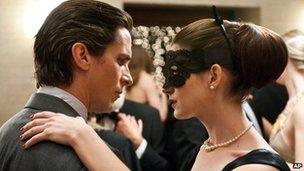
Anne Hathaway joins Christian Bale as cat burglar Selina Kyle in The Dark Knight Rises
The director's statement is significant because of what Jolin calls Blade Runner's "very male-skewed universe... [produced] in the style of a classic noir where women are femme fatales, they're not the protagonists".
So the war isn't won yet, as Hathaway admits. "I don't think it's necessarily a change yet," she says. "I think it's more about opportunities."
Film studios will certainly have taken notice of the strong box office performance of Snow White, Prometheus and Brave. In fact, that could help Hathaway secure a spin-off for her Catwoman character.
But progress could just as easily slip back: Hollywood is always desperate for something new to sell, and while female action heroes are this year's trend, next year it could be talking monkeys or CGI bicycles.
Yet Tony Gilroy is optimistic that the lot of movie heroines is changing for the better.
"God, I hope so," he says.
"I have a 16-year-old daughter and I want that to be part of her imagination."
- Published9 April 2012
- Published25 June 2012
- Published4 April 2012